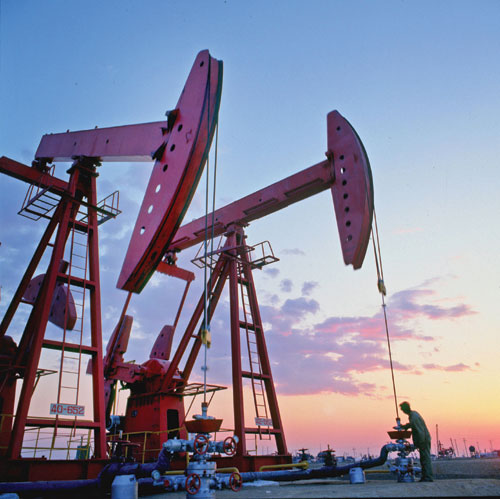Search for oil, gas set for faster expansion
Updated: 2012-02-24 09:33
By Zhou Yan (China Daily)
|
||||||||
Country spent 120b yuan to explore for ore and fuel deposits during 2011
BEIJING - China plans to accelerate geological exploration and survey work for oil and natural gas to ease its rising reliance on energy imports, the Ministry of Land and Resources said on Thursday.
|
 |
|
Oilfield workers in Panjin, Northeast China's Liaoning province. China will speed up oil and natural gas exploration to fuel economic growth and reduce dependence on imported oil. [Photo/ China Daily] |
The ministry is drawing up strategies to achieve breakthroughs in exploration, energy efficiency and replacements for oil and gas, with the ultimate goal of cutting China's expanding dependency on foreign oil and guaranteeing energy security, said Xia Jun, the ministry's deputy counsel
In 2011, China's new proven geological reserves of oil and gas reached 1.37 billion tons, the highest since the Daqing Oilfield - China's biggest - was discovered in the 1960s, according to Wang Changbo, deputy director of the ministry's department of mineral resources reserves.
New proven reserves totaled 5.74 billion tons during the 11th Five-Year Plan (2006-10).
Wang said total new reserves during the current five-year plan, which began last year, would likely continue to grow, without giving specific figures.
China's crude oil demand rose 2.7 percent in 2011, while natural gas use rose 12 percent, according to the National Bureau of Statistics, which didn't give absolute volumes.
China National Petroleum Corp, the country's biggest oil producer, projected in February that China's apparent consumption of crude oil would reach 454 million tons in 2011, with 3.3 percent year-on-year growth.
Apparent consumption includes domestic production and imports.
China, the world's second-biggest oil user, imported 250 million tons of crude oil in 2011, taking its foreign oil dependency ratio slightly past 55 percent.
Analysts agree that China's oil and gas demand will expand more slowly this year, reflecting a deceleration in economic growth and energy-conservation efforts.
But experts also warn that the nation's high reliance on oil imports will threaten the country's energy security.
China's oil-import dependency rate passed an "alarming level" last year amid increasing industrialization and urbanization, said Xu Dachun, another deputy head of the department of mineral resources reserves.
Xu said the ministry has been working to slow the growth of imports, which might decline as peak energy demand waned and new energy sources were developed.
Xu also said that the ministry is encouraging the public and private sectors to invest in exploration and surveying for natural resources.
He added that of the 120 billion yuan ($19 billion) spent on exploration and surveying for ores and other natural resources last year, only 12.5 billion yuan, or about 10 percent, came from the central budget.
More market-oriented policies to diversify financing channels for exploration and to encourage and protect private-sector investment were being discussed and might be announced this year, Xu said.

 Relief reaches isolated village
Relief reaches isolated village
 Rainfall poses new threats to quake-hit region
Rainfall poses new threats to quake-hit region
 Funerals begin for Boston bombing victims
Funerals begin for Boston bombing victims
 Quake takeaway from China's Air Force
Quake takeaway from China's Air Force
 Obama celebrates young inventors at science fair
Obama celebrates young inventors at science fair
 Earth Day marked around the world
Earth Day marked around the world
 Volunteer team helping students find sense of normalcy
Volunteer team helping students find sense of normalcy
 Ethnic groups quick to join rescue efforts
Ethnic groups quick to join rescue efforts
Most Viewed
Editor's Picks

|

|

|

|

|

|
Today's Top News
Health new priority for quake zone
Xi meets US top military officer
Japan's boats driven out of Diaoyu
China mulls online shopping legislation
Bird flu death toll rises to 22
Putin appoints new ambassador to China
Japanese ships blocked from Diaoyu Islands
Inspired by Guan, more Chinese pick up golf
US Weekly

|

|







